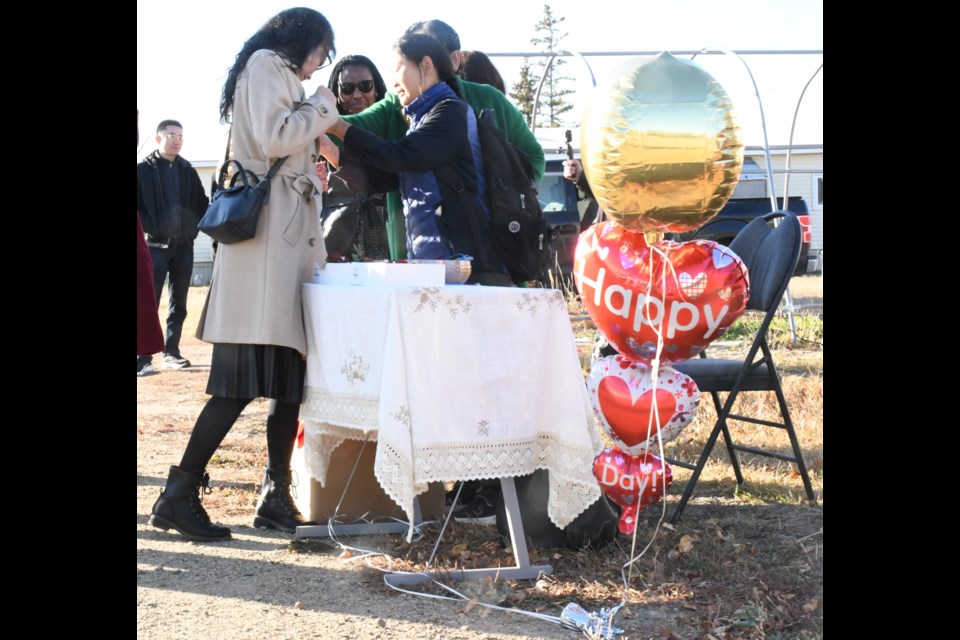MOOSE JAW — Businesswoman Zhu Xiaoming has lived in Moose Jaw for only four years, but she has come to love it so much that she has created a 23-unit housing community north of the city.
Dozens of supporters helped Zhu — in Chinese culture, it’s common practice for names to start with the surname first — launch the Canswan Homeland Community Housing Project on Oct. 30. The community is at 145 North Service Road beside the Moose Jaw Inn.
There was a reception afterward in Zhu’s office in the Mualla Professional Building at 290 Fourth Avenue Northeast.
Zhu’s company, Canswan Holdings Ltd., through its subsidiary, Canswan Farmland Ltd., spent roughly four years and $5 million bringing the project to fruition. Eighteen homes are present and should soon be ready for occupancy, while there will be 23 in total.
Vancouver-based Welkin Renewables is also partnering with Canswan Holdings to install solar panels on every housing unit to bring green energy to Moose Jaw.
The community’s creation is Canswan Holdings’ proactive response to the request from city council for affordable and accessible housing units, Zhu said through interpreter Liu (Ben) Zhaobin. She hoped that the project would bring warmth and shelter to more low-income families.
“Moose Jaw, with its prairie charm and rich history, has captivated me deeply. This city has become my home at heart, inspiring me to write a new book titled ‘Moose Jaw — My Dream Home’ … (that) is filled with heartfelt emotions,” she continued, noting she would publish the book in Chinese and English.
“I believe in destiny, and I am grateful for the opportunity to build this beautiful home (community) together with all of you, for both myself and future generations,” she added.
The businesswoman has also written two other books, both about farming and agriculture in Canada.
Zhu later said that she was “very excited” and “very happy” about this project since the process of completing it was long.
The site originally belonged to the late Les MacKenzie, an influential city councillor and tourism advocate, after whom the famous moose was named. After operating Mac’s Cycle — once located where the casino parking lot now is — he began developing a trailer park in the mid-1970s.
MacKenzie’s daughter, Maxine, 82, attended the housing community’s grand opening and recalled helping him install the underground plumbing around the property. They operated the site from 1979 until she sold it to Canswan Holdings in August — a span of 45 years and 23 days.
“I’m sure my father would be very, very appreciative of this,” Maxine told the crowd. “And I hope that your new venture is a great success for everyone, including the tenants who move in here and the owners of the property.”
Canswan Holdings plans to erect a life-sized statue of MacKenzie in the neighbourhood and establish a small memorial hall to highlight his life and contributions.
Mayor Clive Tolley said he was impressed with the new development, pointing out that this community is a great response to Moose Jaw’s housing shortage. He also thought the site would fill up quickly, considering the city is growing.
Afterward, Zhu — through interpreter Kelvin Hu — explained that she was an agriculture-focused university professor in China before she moved to Vancouver and lived there for 21 years. She then fulfilled a dream and bought a farm south of Moose Jaw — near Kayville, by Avonlea — before moving into the city about four years ago.
Meanwhile, Zhu loves swans — she has several paintings of them in her office — and named her China-based company after them. So, “Canswan” is a combination of Canada and swan.
“I thought Moose Jaw was an ideal city for me to call home because farming is only one of my passions,” Zhu said. “So, Moose Jaw seemed to be the ideal place to expand (the) spectrum of my businesses.”
The businesswoman added that she is also interested in culture, arts, filmmaking and tourism and wants to bring more such resources to Moose Jaw.




